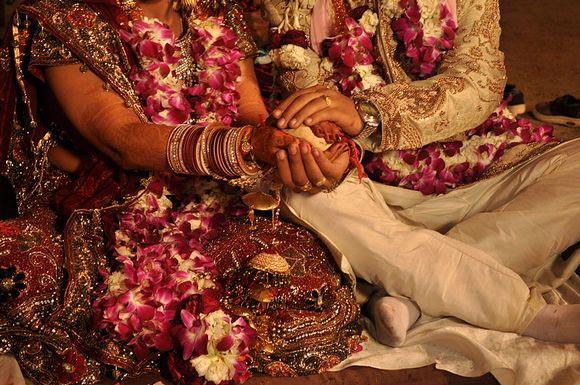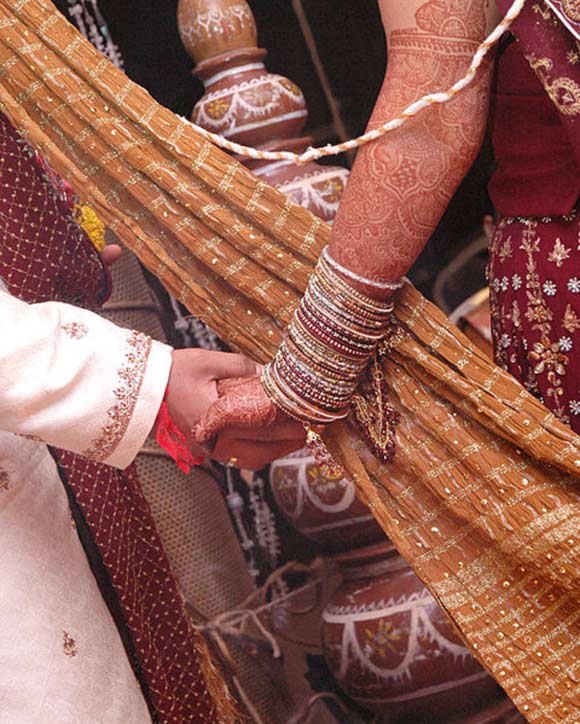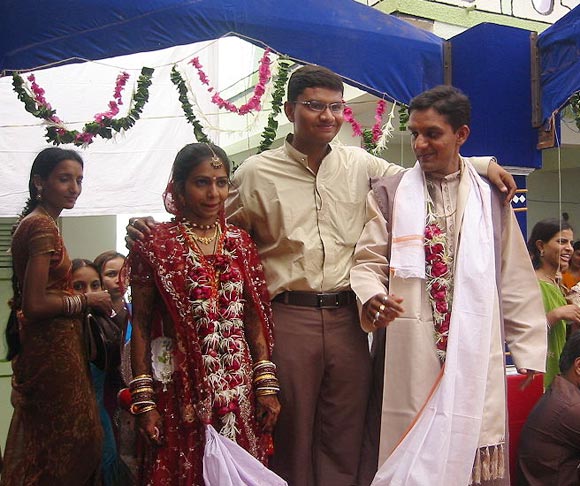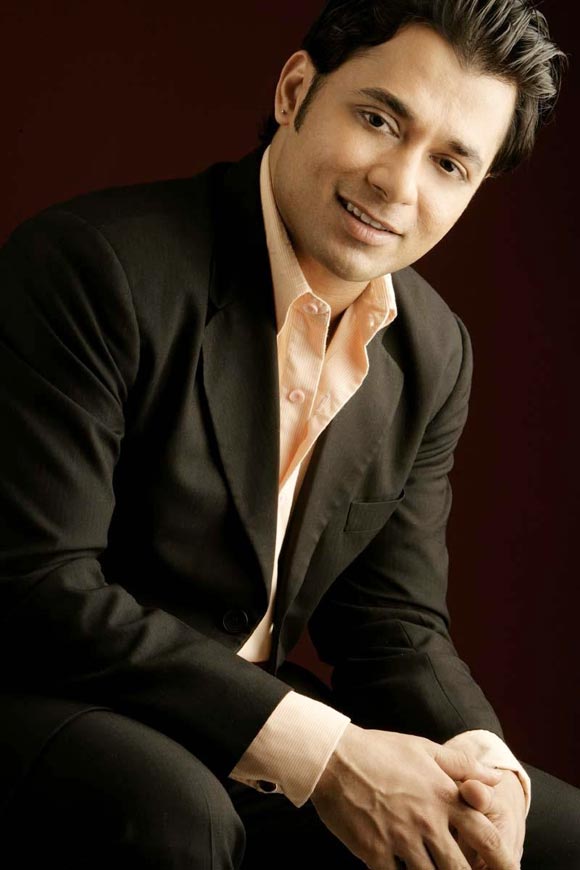 | « Back to article | Print this article |
'The matchmaking business is worth Rs 5,000 crores'
Anupam Mittal started India's first matrimonial website at a time when most Indians didn't know what the Internet was. Today as the company turned 15, Mittal looks back and talks about his success story.
At a time when most Indians hadn't heard of the Internet, Anupam Mittal launched Shaadi.com, a matrimonial website that today claims to have made over two million matches.
The 38-year-old has since then launched a real estate website, Makaan.com and has diversified into mobile content and film production.
Recently, Shaadi.com was also listed in the top 50 most innovative companies by Fast Company the prominent American business magazine for 'proving that marriage, Indian-style, works online as well as off'.
In its 'citation' the magazine points out that unlike 'Match.com or eHarmony, Shaadi's entire goal is marriage' with profiles being more 'resume (style) than come-on, with details like income and education -- and are often read by a prospect's extended family'.
Over the 15 years -- they celebrated their anniversary in October this year -- Mittal claims to have matched over two million couples and is still counting.
Yet in an irony of sorts the 38-year-old entrepreneur remains single.
Anupam Mittal talks about his journey that started when an unassuming marriage broker approached him with a briefcase of biodatas of eligible women.
Shaadi.com was incidental
A decade and a half ago when not a lot of Indians knew what the Internet was, you decided to start Shaadi.com. What were you even thinking?
In 1996 I was living and working in the technology industry in the US. This was when the Internet was just taking off. Yahoo was launched in 1994 Netscape had announced its IPO in 1995.
Back in India salaries weren't very high and it was easy to hire designers and programmers. So while I was working in the US, I started up a company here that developed websites for the Internet.
Shaadi.com was incidental but I knew I wanted to do something on the Internet. I toyed with the idea of starting an email service or something like what Rediff.com was doing too but I wasn't sure.
Most of the time, I used to remote control the company, talking to my people here via ICQ and managing things over the weekends etc.
By the time it was 1998, Internet as a medium began picking up in the West. So we started doing a lot of back office work for companies in France and the US.
Meanwhile we already had started Sagaai.com, which was in its really nascent stages but by 1998, the focus was on web development rather than on developing the website.
However by 1999-2000 when the dotcom bubble had burst in the West and I had quit my job, I saw some serious indications of growth on Sagaai.com.
'Everyone thought I had lost it'
From 2001 onwards, I began spending half my time in India and the other half in the US, also because our early audiences were from the US.
It was around 2000-2001 that I bought the shaadi.com domain name.
This was after the bubble had burst -- the price of the domain names that were going for thousands of dollars earlier were barely getting few hundred dollars now.
I was certain that sagaai.com as a name wouldn't work. We needed something short, one that could strike a chord and be easily remembered. Sagaai.com didn't have that ring to it. Plus, people spelt it differently.
So I decided to buy Shaadi.com, which I was convinced was a great name for a matrimonial website. But the man who owned it was demanding $25,000!
Since the bubble had already burst, I thought if I wait it out, he would probably give it for lesser. I'd started negotiating (by offering him) $5000 but two months later he assured me he was not going to budge.
So, trusting my instinct, I decided to invest most of the money we had saved up to buy the domain name for $ 25,000
At the time, everyone thought I had lost it.
Over the years though the very name proved to be a turning point for us. People started talking about it; the media started taking fancy to the name and even global media companies like BBC and CNN started taking notice of this marriage (pun intended) of tech and culture.
'In India you study to become marriageable'
Could you tell us something about what you were doing in the US before you started up this venture?
As a commerce student in (Mumbai's) Jai Hind College, I didn't like sitting in on a lot of classes so I got into some amount of trouble too. The thing with India is that you don't study to get a qualification. You study to become marriageable. At least that was how it was when I was still a student back in the '80s.
My father had a textile business so I took up commerce. At some point I discovered that I could get through my examinations by studying for a few weeks before the exams, so that's what I ended up doing.
Meanwhile I joined my father's business and for about two years I would travel to his factory in (the distant suburb of) Dombivali. I learnt how the trade works and got an order for 2 million cotton bags from Germany.
As luck would have it, the cotton prices suddenly shot up leaving me in the lurch. I wanted to back out of the deal but my father insisted that I bear the loss if I must but not back out of the deal. I did that.
There were some lessons learnt but after that I never turned back to my father's business.
I graduated from college and spent some time in Europe and the US bumming around, doing odd jobs making ends meet, being part of the university of life so to say.
After about six months I realised I needed to do something more constructive and hoped that higher education would help me get more structured in my thinking.
I ended up getting my business degree from Boston College and joined Micro Strategy, a software company that was into developing business intelligence software.
While working there, I also started up the web development company I mentioned earlier in India.
'Like most other dotcoms we engaged in excesses'
Micro Strategy, the company I joined in the US was a hot company that had a lot of promise like a lot of other dotcoms at the time. From $100mn its valuation shot up to $40mn in a matter of two years.
It was a time of excesses and like most other dotcoms we engaged in them too. The company (like most others) lived 20 years of its lifecycle in three years.
Finally on March 12, 2000 we announced an accounting irregularity. Our stock crashed 66 per cent. NASDAQ that day fell from 5500 to 1100 points and we went from being darlings to being devils of Wall Street.
And around this time, you had already started up this company back in India...
Yes. Like most start-ups, the initial days for us were not very great either. We worked out of an office that was behind a cowshed. So we had to jump over cow dung to reach our place of work!
The good thing was that from the very beginning, the operations of Shaadi/Sagaai.com were cross-subsidised by the web development assignments we took up.
Illustration: Dominic Xavier
'An undertaker is no good if he's dead!'
There's much one's heard about the matchmaker who approached you and gave you the idea for Shaadi.com. Tell us something about him? Do you remember who he was? How did you meet him?
(Laughs) It was a very long time ago. I had just returned after completing my management degree from the US and was taking a break for a few months in India.
I was at my father's office in Zaveri Bazaar when he walked in. He must've been wearing a safari suit and was (I think) carrying a briefcase.
I didn't realise who he was until much later when he brought up the subject of marriage. I wasn't interested in getting married but I got tremendously curious when he opened his briefcase and showed me all the biodatas of single eligible women he was carrying.
We got talking and I got more and more interested in what he was doing rather than what he was offering. I was intrigued and I couldn't help but imagine that my options would be restricted to the number of biodatas he could carry. That's when I thought I could perhaps put all of this information online.
At the end of our conversation, I told him that I wasn't looking to get married but I would love to post the information he has on the Internet. Of course he wasn't very happy and looking suspiciously at me, he left.
And you haven't got married yet...
(Looks away) No I haven't! It's just not happened.
Ever considered using Shaadi.com?
(Laughs) Yes... well as they say an undertaker is no good if he's dead!
'My parents never really understood what I was doing'
Tell us about your family.
My father runs a textile business and both my sisters are married. I was born in South Mumbai and I've moved out of my parents' place though all of us -- my sisters, parents and I -- live quite close to each other.
What did they say when you started Shaadi.com?
I don't think they knew what I was up to. And I don't think they really understood. At first they thought it was just one of my fleeting interests and I kept it that way. It was much later when I started doing well that they sat up and took notice.
How did you go about getting your initial traffic? It was late 90s and Internet was yet to make its presence felt in the country.
Our first clients were NRIs, based in the UK and US who had access to the Internet. That was also the reason why I was spending half my time in the US.
What we also did in the meanwhile was run a national campaign. This got us noticed.
There's also an interesting story behind the campaign. By the time we approached television channels with the idea, the dotcom bubble had burst and they were sceptical on whether we would be able to pay them the fees for the slots.
To convince them that we were indeed serious, we paid them an advance amount to run the ads.
As I also mentioned earlier, the name Shaadi.com also struck a chord with the media who began writing about us and were fascinated by this marriage so to say of culture and technology.
'We've always worked on a transactional model'
How did Mauj come about?
By 2004-05 we had pretty much established ourselves and were doing well. So we decided to look beyond Shaadi.com. Around this time mobile Internet was gaining popularity. So under Mauj we started designing mobile portals.
We also created portals for mobile phone companies from where their users could download stuff on their phones.
What really kept us afloat was that we always worked on a transactional model. Ad revenue was never our primary source of income. Be it on Shaadi.com where members pay us a fee or in Mauj where we would design sites and get paid for it.
Tell us about People Pictures. Did you always want to make movies?
Well, yes in a way. Back in the '90s when I was in the US, like many NRIs, I couldn't relate to Bollywood films anymore. There was a need to find a new narrative, which led to the initial wave of NRI films.
We made Flavours in 2004, which was a learning experience and much later in 2009 we made 99 in India with Cyrus Broacha, Kunal Khemu and Soha Ali Khan.
99 ran into some controversy because you released it during a producers' strike. What happened?
In 2004 the producers and distributors had a disagreement over revenue sharing.
So for the longest time, producers refused to release any movies. 99 was ready to hit the screens during this time. Defying the producers' lobby was blasphemy so we held on.
But when time came, the producers prepared a schedule for the various films' release based on seniority, what clout which producer held etc. So for our film to release we would have had to wait for at least eight more months.
We'd agreed to stand by them if we were guaranteed a release in three to four months. That wasn't happening. So we went ahead and released the movie.
Did it make money?
Yes, eventually it did.
'At any point 50 million people look to get married in India'
Where does your company stand today and what are your future plans?
People Pictures produces movies only occasionally. Makaan.com is relatively new so it still needs a little investment. But Mauj is breaking even and from the looks of it, the industry is poised at an exciting time.
As a country we are number four in terms of Internet usage. In the next two years we will have overtaken Japan and be at number three.
The business of matchmaking, if done correctly, can become a business of Rs 2,000 crores in the next few years.
Currently, as an unorganised industry itself, it is about Rs 5,000 crores of which the organised bit is about Rs 300 to Rs 400 crores.
At any given point I believe there are over 50 million people looking to get married. Each year 20 million do get married of which only 10 per cent are love marriages.
With opportunities to meet partners getting lesser each day -- dating isn't looked upon kindly and the female to male ratio in office can be quite skewed -- you are looking at an incredible demand for services (such as Shaadi.com).
We're hoping to tap this very sector.
The focus at People Group is to create products. I am aware that e-Commerce industry is quite large and profitable but at the end of it, you are nothing but a logistics company -- you take someone's goods and deliver it to someone else. What are you creating? What are you contributing? We'd rather create something of value, which is what drives all of us.








